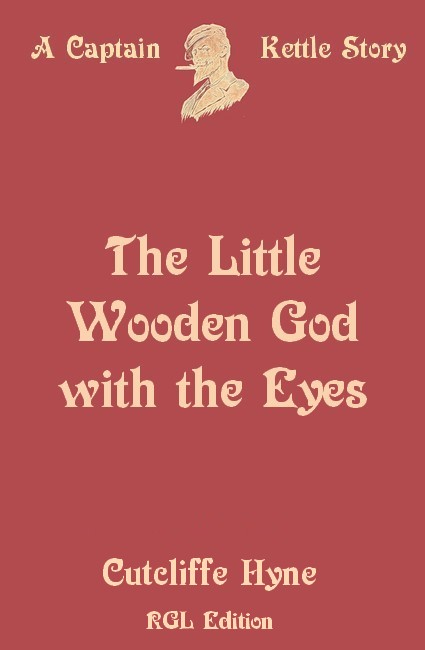
RGL e-Book Cover©
Roy Glashan's Library
Non sibi sed omnibus
Go to Home Page
This work is out of copyright in countries with a copyright
period of 70 years or less, after the year of the author's death.
If it is under copyright in your country of residence,
do not download or redistribute this file.
Original content added by RGL (e.g., introductions, notes,
RGL covers) is proprietary and protected by copyright.

RGL e-Book Cover©

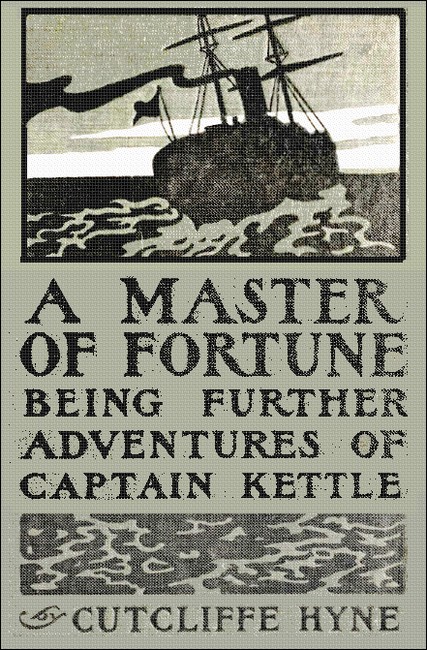
A Master of Fortune, 1898,
with "The Little Wooden God with the Eyes"
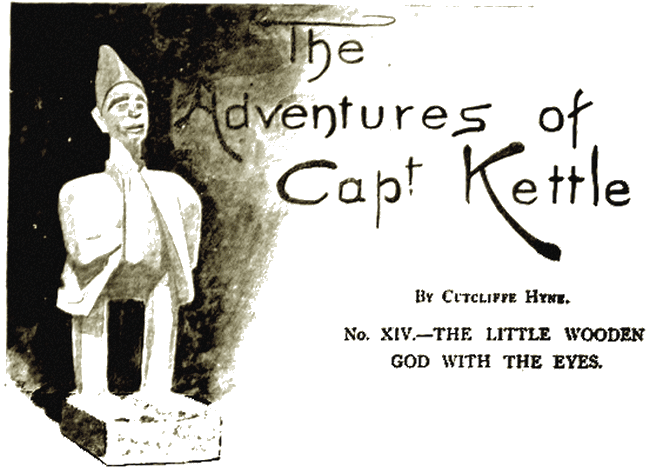
THE colored Mrs. Nilssen, of Banana, gave the pink gin cocktails a final brisk up with the swizzle-stick, poured them out with accurate division, and handed the tray to Captain Kettle and her husband. The men drank off the appetizer and put down the glasses. Kettle nodded a word of praise for the mixture and thanks to its concoctor, and Mrs. Nilssen gave a flash of white teeth, and then shuffled away off the veranda, and vanished within the bamboo walls of the pilotage.
Nilssen sank back into his long-sleeved Madeira chair, a perfect wreck of a man, and Kettle sat up and looked at him with a serious face. "Look here," he said, "you should go home, or at any rate run North for a spell in Grand Canary. If you fool with this health-palaver any longer, you'll peg out."
The Dane stared wistfully out across the blue South Atlantic waters, which twinkled beyond the littered garden and the sand beach. "Yes," he said, "I'd like well enough to go back to my old woman in Boston again, and eat pork and beans, and hear her talk of culture, and the use of missionaries, and all that good old homey rot; but I guess I can't do that yet. I've got to shake this sickness off me right here, first."
"And I tell you you'll never be a sound man again so long as you lib for Congo. Take a trip home, Captain, and let the salt air blow the diseases out of you."
"If I go to sea," said the pilot wearily, "I shall be stitched up within the week, and dropped over to make a hole in the water. I don't know whether I'm going to get well anywhere, but if I do, it's right here. Now just hear me. You're the only living soul in this blasted Congo Free State that I can trust worth a cent, and I believe you've got grit enough to get me cured if only you'll take the trouble to do it. I'm too weak to take on the job myself; and, even if I was sound, I reckon it would be beyond my weight. I tell you it's a mighty big contract. But then, as I've seen for myself, you're a man that likes a scuffle."
"You're speaking above my head. Pull yourself together. Captain, and then, perhaps, I'll understand what you want."
Nilssen drew the quinine bottle toward him, tapped out a little hill of feathery white powder into a cigarette paper, rolled it up, and swallowed the dose. "I'm not raving," he said, "or anywhere near it; but if you want the cold-drawn truth, listen here: I'm poisoned. I've got fever on me, too, I'll grant, but that's nothing more than a fellow has every week or so in the ordinary way of business. I guess with quinine, whiskey, and pills, I can smile at any fever in Africa, and have done this last eight years. But it's this poison that gets me."
"Bosh," said Kettle. "If it was me that talked about getting poisoned, there'd be some sense in it. I know I'm not popular here. But you're a man that's liked. You hit it off with these Belgian brutes, and you make the niggers laugh. Who wants to poison you?"
"All right," said Nilssen; "you've been piloting on the Congo some six months now, and so of course you know all about it. But let me know a bit better. I've watched the tricks of the niggers hereaway for a good many years now, and I've got a big respect for their powers when they mean mischief."
"Have you been getting their backs up, then?"
"Yes. You've seen that big ju-ju in my room?"
"That foul-looking wooden god with the looking-glass eyes?"
"Just that. I don't know where the preciousness comes in, but it's a thing of great value."
"How did you get hold of it?"
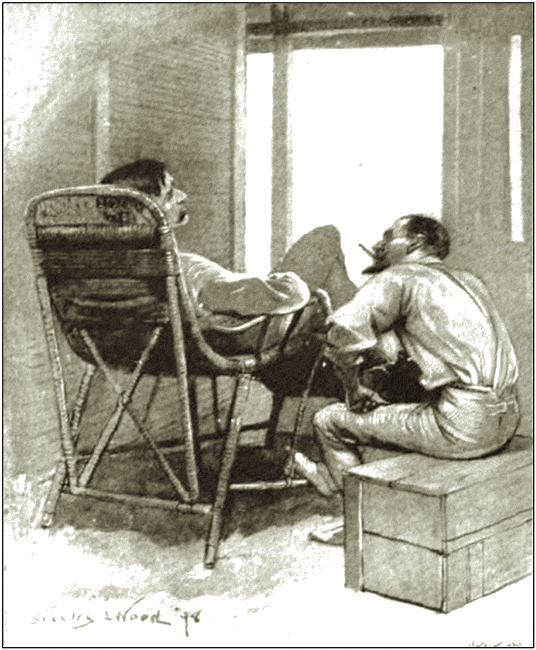
"How did you get hold of it?"
"Well, I suppose if you want to be told flatly, I scoffed it. You see, it was in charge of a passenger boy, who brought it aboard the M'poso at Matadi. He landed across by canoe from Vivi, and wanted steamer passage down to Boma by the M'poso. I was piloting her, and I got my eye on that ju-ju[*] from the very first. Captain Image and that thief of a purser Balgarnie were after it, too, but as it was a bit of a race between us as to who should get it first, one couldn't wait to be too particular."
* A ju-ju in West African parlance may be a large carved idol, or merely a piece of rag, or skin, or anything else that the native is pleased to set up as a charm. Ju-ju also means witchcraft. If you poison a man, you put ju-ju on him. If you see anything you do not understand, you promptly set it down as ju-ju. Similarly chop is food, and also the act of feeding. "One-time" is immediately."
"What did you want it for? Did you know it was valuable then?"
"Oh, no! I thought it was merely a white-washed carved wood god, and I wanted it just to dash to some steamer skipper who had dashed me a case of fizz or something. You know?"
"Yes, I see. Go on. How did you get hold of it?"
"Why, just went and tackled the passenger-boy and dashed him a case of gin; and when he sobered up again, where was the ju- ju? I got it ashore right enough to the pilotage here in Banana, and for the next two weeks thought it was my ju-ju without further palaver.
"Then up comes a nigger to explain. The passenger-boy who had guzzled the gin was no end of a big duke—witch-doctor, and all that, with a record of about three hundred murders to his tally—and he had the cheek to send a blooming ambassador to say things, and threaten, to try and get the ju-ju back. Of course, if the original sportsman had come himself to make his ugly remarks, I'd soon have stopped his fun. That's the best of the Congo Free State. If a nigger down here is awkward, you can always get him shipped off as a slave—soldier, that is—to the upper river, and take darned good care he never comes back again. And, as a point of fact, I did tip a word to the commandant here and get that particular ambassador packed off out of harm's way. But that did no special good. Before a week was through up came another chap to tackle me. He spoke flatly about pains and penalties if I didn't give the thing up; and he offered money—or rather ivory, two fine tusks of it, worth a matter of twenty pounds, as a ransom—and then I began to open my eyes."
"Twenty pounds for that ju-ju! Why, I've picked up many a one better carved for a shilling."
"Well, this bally thing has value; there's no doubt about that. But where the value comes in, I can't make out. I've overhauled it times and again, but can't see it's anything beyond the ordinary. However, if a nigger of his own free will offered two big tusks to get the thing back, it stands to reason it's worth a precious sight more than that. So when the second ambassador came, I put the price down at a quarter of a ton of ivory, and waited to get it."
Kettle whistled. "You know how to put on the value," he said. "That's getting on for £400 with ivory at its present rates."
"I was badly in want of money when I set the figure. My poor little wife in Bradford had sent me a letter by the last Antwerp mail saying how hard-up she was, and the way she wrote regularly touched me."
"I don't like it," Kettle snapped.
"What, my being keen about the money?"
"No; your having such a deuce of a lot of wives."
"But I am so very domesticated," said Nilssen. "You don't appreciate how domesticated I am. I can't live as a bachelor anywhere. I always like to have a dear little wife and a nice little home to go to in whatever town I may be quartered. But it's a great expense to keep them all provided for. And besides, the law of most countries is so narrow-minded. One has to be so careful."
Kettle wished to state his views on bigamy with clearness and point, but when he cast his eyes over the frail wreck of a man in the Madeira chair, he forebore. It would not take very much of a jar to send Captain Nilssen away from this world to the Place of Reckoning which lay beyond. And so with a gulp he said instead: "You're sure it's deliberate poisoning?"
"Quite. The nigger who came here last about the business promised to set ju-ju on me, and I told him to do it and be hanged to him. He was as good as his word. I began to be bad the very next day."
"How's it managed?"
"Don't know. They have ways of doing these things in Africa which we white men can't follow."
"Suspect any one?"
"No. And if you're hinting at Mrs. Nilssen in the pilotage there, she's as staunch as you are, bless her dusky skin. Besides, what little chop I've managed to swallow since I've been bad, I've always got out of fresh unopened tins myself."
"Ah," said Kettle; "I fancied some one had been mixing up finely powdered glass in your chop. It's an old trick, and you don't twig it till the doctors cut you up after you're dead."
"As if I wasn't up to a kid's game like that!" said the sick man with feeble contempt. "No, this is regular ju-ju work, and it's beyond the Belgian doctor here, and it's beyond all other white men. There's only one cure, and that's to be got at the place where the poisoning palaver was worked from."
"And where's that?"
Captain Nilssen nodded down the narrow slip of sand, and mangroves, and nut palms, on which the settlement of Banana is built, and gazed with his sunken eyes at the smooth, green slopes of Africa beyond. "Dem village he lib for bush," he said.
"Up country village, eh? They're a nice lot in at the back there, according to accounts. But can't you arrange it by your friend the ambassador?"
"He's not the kind of fool to come back. He's man enough to know he'd get pretty well dropped on if I could get him in my reach again."
"Then tell the authorities here, and get some troops sent up."
"What' d be the good of that? They might go, or they mightn't. If they did, they'd do a lot of shooting, collect a lot of niggers' ears, steal what there was to pick up, and then come back. But would they get what I want out of the witch-doctor? Not much. They'd never so much as see the beggar. He'd take far too big care of his mangy hide. He wouldn't stop for fighting- palaver. He'd be off for bush, one-time. No, Kettle, if I'm to get well, some white man will have to go up by his lonesome for me, and square that witch-doctor by some trick of the tongue."
"Which is another way of saying you want me to risk my skin to get you your prescription?"
"But, my lad, I won't ask you to go for nothing. I don't suppose you are out here on the Congo just for your health. You've said you've got a wife at home, and I make no doubt you're as fond of her and as eager to provide for her as I am for any of mine. Well and good. Here's an offer. Get me cured, and I'll dash you the ju-ju to make what you can out of it."
Kettle stretched out his fingers. "Right," he said. "We'll trade on that." And the pair of them shook hands over the bargain.
It was obvious, if the thing was to be done at all, it must be set about quickly. Nilssen was an utter wreck. Prolonged residence in this pestilential Congo had sapped his constitution; the poison was constantly eating at him; and he must either get relief in a very short time, or give up the fight and die. So that same afternoon saw Kettle journeying in a dug-out canoe over the beer-colored waters of the river, up stream, toward the witch-doctor's village.
Two savages (one of them suffering from a bad attack of yaws) propelled the craft from her forward part in erratic zig-zags; amidships sat Captain Kettle in a Madeira chair under a green- lined white umbrella; and behind him squatted his personal attendant, a Krooboy, bearing the fine old Coast name of Brass Pan. The crushed marigold smell from the river closed them in, and the banks crept by in slow procession.
The main channels of the Congo Kettle knew with a pilot's knowledge; but the canoe-men soon left these, and crept off into winding backwaters, with wire-rooted mangroves sprawling over the mud on their banks, and strange whispering beast-noises coming from behind the thickets of tropical greenery. The sun had slanted slow; ceibas and silk-cotton woods threw a shade dark almost as twilight; but the air was full of breathless heat, and Kettle's white drill clothes hung upon him clammy and damp. Behind him, in the stern of the canoe, Brass Pan scratched himself plaintively.
Dark fell and the dug-out was made fast to a mangrove root. The Africans covered their heads to ward off ghosts, and snored on the damp floor of the canoe. Kettle took quinine and dozed in the Madeira chair. Mists closed round them, white with damp, earthy-smelling with malaria. Then gleams of morning stole over the trees and made the mists visible, and Kettle woke with a seaman's promptitude. He roused Brass Pan, and Brass Pan roused the canoe-men, and the voyage proceeded.
Through more silent waterways the clumsy dug-out made her passage, where alligators basked on the mudbanks and sometimes swam up from below and nuzzled the sides of the boat, and where velvety black butterflies fluttered in dancing swarms across the shafts of sunlight; and at last her nose was driven on to a bed of slime, and Kettle was invited to "lib for beach."
Brass Pan stepped dutifully over the mud, and Captain Kettle mounted his back and rode to dry ground without as much as splashing the pipe-clay on his dainty canvas shoes. A bush path opened out ahead of them, winding, narrow, uneven, and the man with the yaws went ahead and gave a lead.
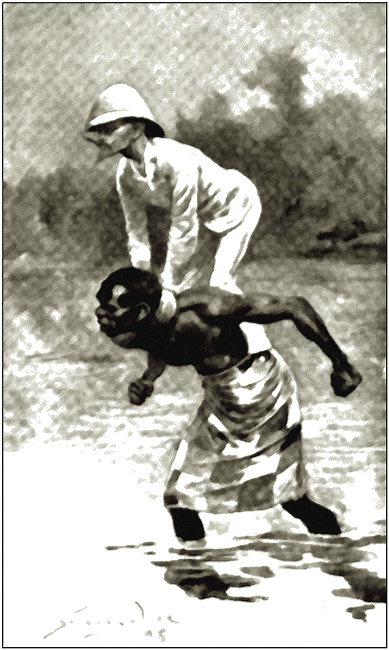
Captain Kettle mounted his back and rode to dry ground.
As a result of exposure to the night mists of the river, Captain Kettle had an attack of fever on him which made him shake with cold and burn with heat alternately. His head was splitting, and his skin felt as though it had been made originally to suit a small boy, and had been stretched to near bursting-point to serve its present wearer.
In the forest, the path was a mere tunnel amongst solid blocks of wood and greenery; in the open beyond, it was a slim alley between grass-blades eight feet high; and the only air which nourished them as they marched was hot enough to scorch the lungs as it was inhaled. And if in addition to all this, it be remembered that the savages he was going to visit were practising cannibals, were notoriously treacherous, were violently hostile to all whites (on account of many cruelties bestowed by Belgians), and were especially exasperated against the stealer of their idol, it will be seen that from an ordinary point of view Captain Kettle's mission was far from appetizing.
The little sailor, however, carried himself as jauntily as though he were stepping out along a mere pleasure parade, and hummed an air as he marched. In ordinary moments I think his nature might be described as almost melancholy; it took times of stress like these to thoroughly brighten him.
The path wound, as all native paths do wind, like some erratic snake amongst the grasses, reaching its point with a vast disregard for distance expended on the way. It led, with a scramble, down the sides of ravines; it drew its followers up steep rock-faces that were baked almost to cooking heat by the sun; and finally, it broke up into fan-shape amongst decrepit banana groves, and presently ended amongst a squalid collection of grass and wattle huts which formed the village.
Dogs announced the arrival to the natives, and from out of the houses bolted men, women, and children, who dived out of sight in the surrounding patches of bush.
The man with the yaws explained: "Dem Belgians make war- palaver often. People plenty much frightened. People think we lib for here on war-palaver."
"Silly idiots!" said Captain Kettle. "Hullo, by James! here's a white man coming out of that chimbeque!"
"He God-man. Lib for here on gin-palaver."
"Trading missionary, is he? Bad breed that. And the worst of it is, if there's trouble, he'll hold up his cloth, and I can't hit him." He advanced toward the white man, and touched his helmet. "Bon jour, Monsieur."
"Howdy?" said the missionary. "I'm as English as yourself—or rather Amurrican. Know you quite well by sight, Captain. Seen you on the steamers when I was stationed at our headquarters in Boma. What might you be up here for?"
"I've a bit of a job on hand for Captain Nilssen of Banana."
"Old Cappie Nilssen? Know him quite well. Married him to that Bengala wife of his, the silly old fool. Well, captain, come right into my chimbeque, and chop."
"I'll have some quinine with you, and a cocktail. Chop doesn't tempt me just now. I've a dose of fever on hand."
"Got to expect that here, anyway," said the missionary. "I haven't had fever for three days now, but I'm due for another dose to-morrow afternoon. Fever's quite regular with me. It's a good thing that, because I can fit in my business accordingly."
"I suppose the people at home think you carry the Glad Tidings only?"
"The people at home are impracticable fools, and I guess when I was 'way back in Boston I was no small piece of a fool too. I was sent out here 'long with a lot more tenderfeet to plant beans for our own support, and to spread the gospel for the glory of America. Well, the other tenderfeet are planted, and I'm the only one that's got any kick left. The beans wouldn't grow, and there was no sort of living to be got out of spreading a gospel which nobody seemed to want. So I had to start in and hoe a new row for myself."
"Set up as a trader, that is?"
"You bet. It's mostly grist that comes to me: palm-oil, rubber, kernels, and ivory. Timber I haven't got the capital to tackle, and I must say the ivory's more to figure about than finger. But I've got the best connection of any trader in gin and guns and cloth in this section, and in another year I'll have made enough of a pile to go home, and I guess there are congregations in Boston that'll just jump at having a returned Congo missionary as their minister."
"I should draw the line at that, myself," said Kettle stiffly.
"Dare say. You're a Britisher, and therefore you're a bit narrow-minded. We're a vury adaptable nation, we Amurricans. Say, though, you haven't told me what you're up here for yet? I guess you haven't come just in search of health?"
Captain Kettle reflected. His gorge rose at this man, but the fellow seemed to have some sort of authority in the village, and probably he could settle the question of Nilssen's ailment with a dozen words. So he swallowed his personal resentment, and, as civilly as he could, told the complete tale as Nilssen had given it to him.
The trader missionary's face grew crafty as he listened. "Look here, you want that old sinner Nilssen cured?"
"That's what I came here for."
"Well, then, give me the ju-ju, and I'll fix it up for you."
"The ju-ju's to be my fee," said Kettle. "I suppose you know something about it? You're not the kind of man to go in for collecting valueless curiosities."
"Nop. I'm here on the make, and I guess you're about the same. But I wouldn't be in your shoes if the people in the village get to know that you've a finger in looting their idol."
"Why?"
"Oh, you'll die rather painfully, that's all. Better give the thing up, Captain, and let me take over the contract for you. It's a bit above your weight."
Kettle's face grew grim. "Is it?" he said. "Think I'm going to back down for a tribe of nasty, stinking, man-eating niggers? Not much."
"Well," said the missionary, "don't get ruffled. I've got no use for quarrelling. Go your way, and if things turn out ugly don't say I didn't give you the straight cinch, as one white man to another in a savage country. And now, it's about my usual time for siesta."
"Right," said Kettle. "I'll siesta too. My fever's gone now, and I'm feeling pretty rocky and mean. Sleep's a grand pick-me- up."
They took off their coats, and lay down then under filmy mosquito bars, and presently sleep came to them. Indeed, to Kettle came so dead an unconsciousness that he afterward had a suspicion (though it was beyond proof) that some drug had been mixed with his drink. He was a man who at all times was extraordinarily watchful and alert. Often and often during his professional life his bare existence had depended on the faculty for scenting danger from behind the curtain of sleep; and his senses in this direction were so abnormally developed as to verge at times on the uncanny. Cat-like is a poor-word to describe his powers of vigilance.
But there is no doubt that in this case his alertness was dulled. The fatigue of the march, his dose of fever, his previous night of wakefulness in the canoe, all combined to undermine his guard; and, moreover, the attack of the savages was stealthy in the extreme. Like ghosts, they must have crept back from the bush to reconnoitre their village; like daylight ghosts, they must have surrounded the trader missionary's hut and peered at the sleeping man between the bamboos of the wall, and then made their entrance; and it must have been with the quickness of wild beasts that they made their spring.
Kettle woke on the instant that he was touched, and started to struggle for his life, as indeed he had struggled many a time before. But the numbers of the blacks put effective resistance out of the question. Four of them pressed down each arm on to the bed, four each leg, three pressed on his head. Their animal faces champed and gibbered at him; the animal smell of them made him splutter and cough.
Captain Kettle was not a man who often sought help from others; he was used to playing a lone-handed fight against a mob; but the suddenness of the attack, the loneliness of his surroundings, and the dejection due to his recent dose of fever, for the first instant almost unnerved him, and on the first alarm he sang out lustily for the missionary's help. There was no answer. With a jerk he turned his head, and saw that the other bed was empty. The man had left the hut.
For a time the captive did not actively resist further. In a climate like that of the Congo one's store of physical strength is limited, and he did not wish to earn unnecessarily severe bonds by wasting it. As it was, he was tied up cruelly enough with grass rope, and then taken from the hut and flung down under the blazing sunshine outside.
Presently a fantastic form danced up from behind one of the huts, daubed with colored clays, rigged out with a thousand tawdry charms, and cinctured round the middle by a girdle of half-picked bones. He wafted an evil odor before him as he advanced, and he came up and stood with one foot on Kettle's breast in the attitude of a conqueror.
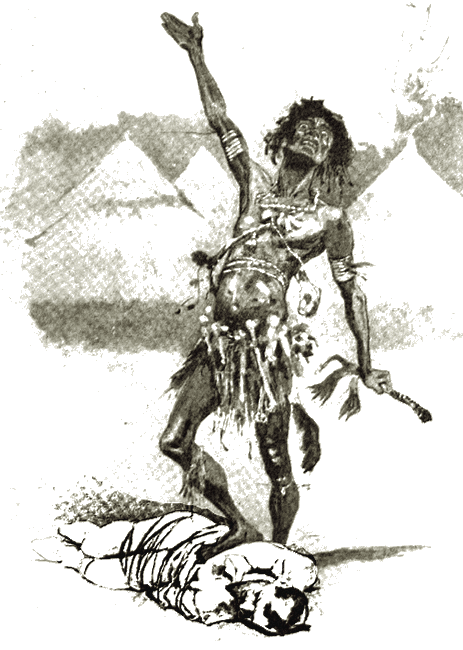
He stood with one foot on Kettle's breast
in the attitude of a conqueror.
This was the witch-doctor, a creature who held power of life and death over all the village, whom the villagers suffered to test them with poison, to put them to unnamable tortures, to rob them as he pleased,—to be, in fact, a kind of insane autocrat working any whim that seized him freely in their midst. The witch-doctor's power of late had suffered. The white man Nilssen had "put bigger ju-ju" on him, and under its influence had despoiled him of valuable property. Now was his moment of counter triumph. The witch-doctor stated that he brought this other white man to the village by the power of his spells; and the villagers believed him. There was the white man lying on the ground before them to prove it.
Remained next to see what the witch-doctor would do with his captive.
The man himself was evidently at a loss, and talked, and danced, and screamed, and foamed, merely to gain time. He spoke nothing but Fiote, and of that tongue Kettle knew barely a single word. But presently the canoe-man with the yaws was dragged up, and, in his own phrase, was bidden to act as "linguister."
"He say," translated the man with the yaws, "if dem big ju- ju lib back for here, he let you go."
"And if not?"
The interpreter put a question, and the witch-doctor screamed out a long reply, and then stooped and felt the captive over with his fingers, as men feel cattle at a fair.
"Well?" said Kettle impatiently; "if he doesn't get back the wooden god, let's hear what the game is next?"
"Me no sabbey. He say you too small and thin for chop."
Captain Kettle's pale cheeks flushed. Curiously enough it never occurred to him to be grateful for this escape from a cannibal dinner-table. But his smallness was a constant sore to him, and he bitterly resented any allusion to it.
"Tell that stinking scarecrow I'll wring his neck for him before I'm quit of this village."
"Me no fit," said the linguister candidly. "He kill me now if I say that, same's he kill you soon."
"Oh, he's going to kill me, is he?"
The interpreter nodded emphatically. "Or get dem big ju- ju," he added.
"Ask him how Cappie Nilssen can be cured."
The man with the yaws put the question timidly enough, and the witch-doctor burst into a great guffaw of laughter. Then after a preliminary dance, he took off a little packet of leopard skin, which hung amongst his other charms, and stuffed it deep inside Kettle's shirt.
The interpreter explained: "Him say he put ju-ju on Cappie Nilssen, and can take it off all-e-same easy. Him say you give Cappie Nilssen dis new ju-ju for chop, an' he live for well one-time."
"He doesn't make much trouble about giving it me, anyway," Kettle commented. "Looks as if he felt pretty sure he'd get that idol, or else take the change out of my skin." But, all the same, when the question was put to him again as to whether he would surrender the image, he flatly refused. There was a certain pride about Kettle which forbade him to make concessionary treaties with an inferior race.
So forthwith, having got this final refusal, the blacks took him up again, and under the witch-doctor's lead carried him well beyond the outskirts of the village. There was a cleared space here, and on the bare, baked earth they laid him down under the full glare of the tropical sunshine. For a minute or so they busied themselves with driving four stout stakes into the ground, and then again they took him up, and made him fast by wrists and ankles, spread-eagle fashion, to the stakes.
At first he was free to turn his head, and with a chill of horror he saw he was not the first to be stretched out in that clearing. There were three other sets of stakes, and framed in each was a human skeleton, picked clean. With a shiver he remembered travellers' tales on the steamers of how these things were done. But then the blacks put down other stakes so as to confine his head in one position, and were proceeding to prop open his mouth with a piece of wood, when suddenly there seemed to be a hitch in the proceedings.
The witch-doctor asked for honey—Kettle recognized the native word—and none was forthcoming. Without honey they could not go on, and the captive knew why. One man was going off to fetch it, but then news was brought that the Krooboy Brass Pan had been caught, and the whole gang of them went off helter- skelter toward the village—and again Kettle knew the reason for their haste.
So there he was left alone for the time being with his thoughts, lashed up beyond all chance of escape, scorched by an intolerable sun, bitten and gnawed by countless swarms of insects, without chance of sweeping them away. But this was ease compared with what was to follow. He knew the fate for which he was apportioned, a common fate amongst the Congo cannibals. His jaws would be propped open, a train of honey would be led from his mouth to a hill of driver ants close by, and the savage insects would come up and eat him piecemeal while he still lived.
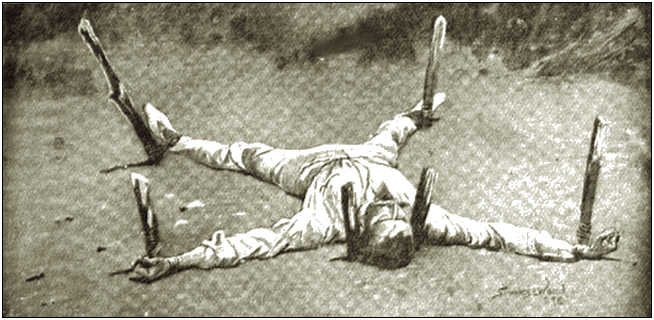
He was left alone for the time being with his thoughts
He had seen driver ants attack a house before, swamp fires lit in their path by sheer weight of numbers, put the inhabitants to flight, and eat everything that remained. And here, in this clearing, if he wanted further proof of their power, were the three picked skeletons lying stretched out to their stakes.
There are not many men who could have preserved their reason under monstrous circumstances such as these, and I take it that there is no man living who dare up and say that he would not be abominably frightened were he to find himself in such a plight. In these papers I have endeavored to show Captain Owen Kettle as a brave man, indeed the bravest I ever knew; but I do not think even he would blame me if I said he was badly scared then.
He heard noises from the village which he could not see beyond the grass. He heard poor Brass Pan's death-shriek; he heard all the noises that followed, and knew their meaning, and knew that he was earning a respite thereby; he even heard from over the low hills the hoot of a steamer's siren as she did her business on the yellow waters of the Congo, in crow flight perhaps not a good rifle-shot from where he lay stretched.
It seemed like a fantastic dream to be assured in this way that there were white men, civilized white men, men who could read books and enjoy poetry, sitting about swearing and drinking cocktails under a decent steamer's awnings close by this barbaric scene of savagery. And yet it was no dream. The flies that crept into his nose and his mouth and his eye-sockets, and bit him through his clothing, and the hateful sounds from the village assured him of all its reality.
The blazing day burnt itself to a close, and night came hard upon its heels, still baking and breathless. The insects bit worse than ever, and once or twice Kettle fancied he felt the jaws of a driver ant in his flesh, and wondered if news would be carried to the horde in the ant-hill, which would bring them out to devour their prey without the train of honey being laid to lure them. Moreover, fever had come on him again, and with one thing and another it was only by a constant effort of will that he prevented himself from giving way and raving aloud in delirium.
It was under these circumstances, then, that the missionary came to him again, and once more put in a bid for the ju- ju which lay at the pilotage. Kettle roundly accused the man of having betrayed him, and the fellow did not deny it with any hope of being believed. He had got to get his pile somehow, so he said: the ju-ju had value, and if he could not get hold of it one way, he had to work it another. And finally, would Kettle surrender it then, or did he want any more discomfort.
Now I think it is not to the little sailor's discredit to confess that he surrendered without terms forthwith. "The thing's yours for when you like to fetch it," he snapped out ungraciously enough, and the missionary at once stooped and cut the grass ropes, and set to chafing his wrists and ankles. "And now," he said, "clear out for your canoe at the river-side for all you're worth, Captain. There's a big full moon, and you can't miss the way."
"Wait a bit," said Kettle. "I'm remembering that I had an errand here. Can you give me the right physic to pull Captain Nilssen round?"
"You have it in that leopard-skin parcel inside your shirt. I saw the witch-doctor give it you."
"Oh! you were looking on, were you?"
"Yes."
"By James! I've a big mind to leave my marks on you, you swine!"
The trader missionary whipped out a revolver. "Guess I'm heeled, sonny. You'd better go slow. You'd—"
There was a rush, a dodge, a scuffle, a bullet whistling harmlessly up into the purple night, and that revolver was Captain Kettle's.
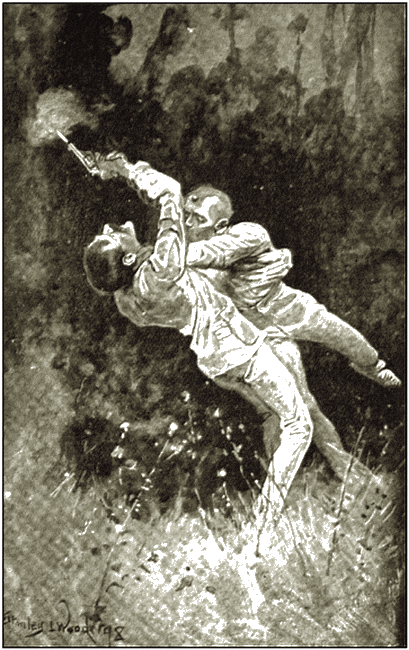
There was a rush, a dodge, a scuffle.
"The cartridges you have in your pocket."
"I've only three. Here they are, confound you! Now, what are you going to do next? You've waked the village. You'll have them down on you in another moment. Run, you fool, or they'll have you yet."
"Will they?" said Kettle. "Well, if you want to know, I've got poor old Brass Pan to square up for yet. I liked that boy." And with that, he set off running down a path between the walls of grasses.
A negro met him in the narrow cut, yelled with surprise, and turned. He dropped a spear as he turned, and Kettle picked it up and drove the blade between his shoulder-blades as he ran. Then on through the village he raged like a man demented. With what weapons he fought he never afterward remembered. He slew with whatever came to his hand. The villagers, wakened up from their torpid sleep, rushed from the grass and wattle houses on every hand. Kettle in his Berserk rage charged them whenever they made a stand, till at last all fled from him as though he were more than human.
Bodies lay upon the ground staring up at the moon; but there were no living creatures left, though the little sailor, with bared teeth and panting breath, stood there waiting for them. No; he had cleared the place, and only one other piece of retribution lay in his power. The embers of a great fire smouldered in the middle of the clearing, and with a shudder (as he remembered its purpose) he shovelled up great handfuls of the glowing charcoal and sowed it broadcast on the dry grass roofs of the chimbeques. The little crackling flames leaped up at once; they spread with the quickness of a gunpowder train; and in less than a minute a great cataract of fire was roaring high into the night.
Then, and not till then, did Captain Kettle think of his own retreat. He put the three remaining cartridges into the empty chambers of his revolver, and set off at a jog-trot down the winding path by which he had come up from the river.
His head was throbbing then, and the stars and the grasses swam before his eyes. The excitement of the fight had died away—the ills of the place gripped every fibre of his body. Had the natives ambushed him along the path, I do not think he could possibly have avoided them. But those natives had had their lesson, and they did not care to tamper with Kettle's ju- ju again. And so he was allowed to go on undisturbed, and somehow or other he got down to the river-bank and the canoe.
He did not do the land journey at any astonishing pace. Indeed, it is a wonder he ever got over it at all. More than once he sank down half unconscious in the path, and up all the steeper slopes he had to crawl animal fashion on all-fours. But by daybreak he got to the canoe, and pushed her off, and by a marvellous streak of luck lost his way in the inner channels, and wandered out on to the broad Congo beyond.
I say this was a streak of luck, because by this time consciousness had entirely left him, and on the inner channels he would merely have died, and been eaten by alligators, whereas, as it was, he got picked up by a State launch, and taken down to the pilotage at Banana.
It was Mrs. Nilssen who tediously nursed him back to health. Kettle had always been courteous to Mrs. Nilssen, even though she was as black and polished as a patent leather boot; and Mrs. Nilssen appreciated Captain Owen Kettle accordingly.
With Captain Nilssen, pilot of the lower Congo, Kettle had one especially interesting talk during his convalescence. "You may as well take that troublesome wooden god for yourself now," said Nilssen. "But, if I were you, I'd ship it home out of harm's way by the next steamer."
"Hasn't that missionary brute sent for it yet?"
Captain Nilssen evaded the question. "I'll never forget what you've done for me, my lad. When you were brought in here after they picked you up, you looked fit to peg out one-time, but the only sane thing you could do was to waggle out a little leopard- skin parcel, and bid me swallow the stuff that was inside. You'd started out to get me that physic, and, by gum, you weren't happy till I got it down my neck."
"Well, you look fit enough now."
"Never better."
"But about the missionary brute?"
"Well, my lad, I suppose you're well enough to be told now. He's got his trading cut short for good. That nigger with the yaws who paddled you up brought down the news. The beggars up there chopped him, and I'm sure I hope he didn't give them indigestion."
"My holy James!"
"Solid. His missionary friends here have written home a letter to Boston which would have done you good to see. According to them, the man's a blessed martyr, nothing more or less. The gin and the guns are left clean out of the tale; and will Boston please send out some more subscriptions, one-time? You'll see they'll stick up a stained-glass window to that joker in Boston, and he'll stand up there with a halo round his head as big as a frying-pan. And, oh! won't his friends out here be resigned to his loss when the subscriptions begin to hop in from over the water."
"Well, there's been a lot of trouble over a trumpery wooden idol. I fancy we'd better burn it out of harm's way."
"Not much," said Nilssen with a sigh. "I've found out where the value comes in, and as you've earned them fairly and squarely, the dividends are yours to stick to. One of those looking-glass eyes was loose, and I picked it out. There was a bit of green glass behind. I picked out the other eye, and there was a bit of green glass at the back of that too."
"Oh, the niggers'll use anything for ju-ju."
"Wait a bit. I'd got my notions as to what that green glass was, and so I toted them in my pocket up and down the river and asked every man who was likely to know a jewel what he thought. They aren't green glass at all. They're emeralds. They're come from the Lord knows where, but that doesn't matter. They're worth fifty pounds apiece at the very lowest, and they're yours, my lad, to do what you like with."
Captain Kettle lay back on his pillow and smiled complacently. "That money'll just set up my Missis nicely in a lodging-house. Now I can go on with my work here, and know that whatever happens she and the kids are provided for."
"Eh, well," said Nilssen with a sigh, "she'll be nicely fixed up now. I wish I could make provision like that for my old women."
Roy Glashan's Library
Non sibi sed omnibus
Go to Home Page
This work is out of copyright in countries with a copyright
period of 70 years or less, after the year of the author's death.
If it is under copyright in your country of residence,
do not download or redistribute this file.
Original content added by RGL (e.g., introductions, notes,
RGL covers) is proprietary and protected by copyright.